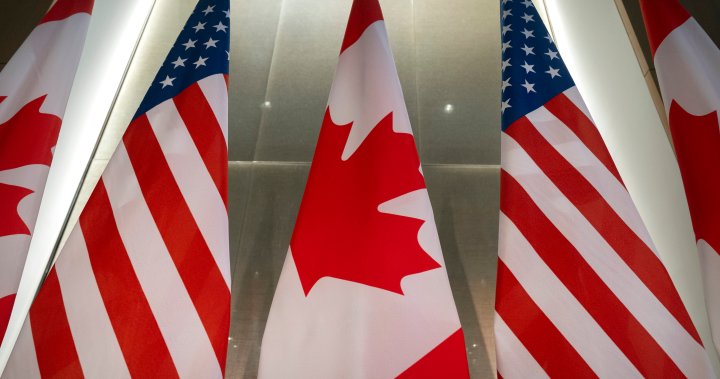How a business on the border line is seizing opportunity in a trade war – National

As trade tensions between Canada and the United States simmer, one small company operating on the border may be seeing opportunity in the uncertainty.
Nestled between Dundee, Que., and Port Covington, N.Y., Halfway House Freight Forwarding is in a building that straddles the Canada-U.S. border. It was originally a hotel, constructed in the early 1800s.
“It was here before the line,” says owner Louis Patenaude. “That’s why the line is there.”
Patenaude’s family has owned the building for 80 years. It’s served many purposes: a bar, a hotel and, for a time, his childhood home.
Now, it’s a freight forwarding business with two doors — one opening into Canada for customers, and one opening into the United States for deliveries.
That unique setup places it in a kind of no-man’s-land between Canadian and American customs checkpoints. The result is a legal grey area that’s become a logistical sweet spot.

Canadian customers have their orders shipped to the building’s U.S. address. When the order arrives, they can walk in from the Canadian side and pick up their packages. They then head directly to Canadian customs to declare and pay any applicable duties.

Get daily National news
Get the day’s top news, political, economic, and current affairs headlines, delivered to your inbox once a day.
Halfway House is only metres away from the Dundee border crossing and customers are watched closely.
Patenaude charges a fee, usually less than $10, but customers don’t have to pay for cross-border delivery or brokerage fees.
Sebastien Savard lives outside of Montreal and recently had truck parts delivered to Halfway House. It was an hour drive, but he says he likely saved a few hundred dollars.
“You don’t have to go through both sides of the customs,” Savard says. “It’s easier, and it’s a nice drive.”
Patenaude’s father, Paul-Maurice, ran the bar until 1990, and shifted the business to take advantage of the unique location.
“Anything that can be shipped, we can take,” Patenaude says. “Amazon, eBay, Walmart — you name it.”

The business is small, but it serves a niche clientele, and demand can spike when cross-border trade becomes more complicated. As tariffs and trade policies shift, so does interest in this unusual setup.
Patenaude, now retired, says the income mostly helps cover utilities and property taxes — bills that come from both countries. He jokes that he didn’t want the family business when he was younger, but now he’s the one keeping it going.
“I used to tell my dad, ‘Don’t build a business for me when I retire. I want to travel,’” he says with a grin. “Well, now I travel from the house to here.”
He admits there’s uncertainty ahead, especially if tariffs rise or border policies change, but what he truly dreams of isn’t retirement or vacation.
Patenaude says if won enough money with a lottery ticket, he’d put it back into the building.
“My dream is to rebuild it, and move back in,” he says. “It’s in my blood.”
© 2025 Global News, a division of Corus Entertainment Inc.








